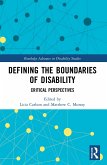- Gebundenes Buch
- Merkliste
- Auf die Merkliste
- Bewerten Bewerten
- Teilen
- Produkt teilen
- Produkterinnerung
- Produkterinnerung
This open access book looks at the development and consolidation of EU disability law as a distinct field of enquiry.
Andere Kunden interessierten sich auch für
![Implementing International Disability Law in the European Union Implementing International Disability Law in the European Union]() Ottavio QuiricoImplementing International Disability Law in the European Union144,99 €
Ottavio QuiricoImplementing International Disability Law in the European Union144,99 €![EU Neighbourhood Law EU Neighbourhood Law]() Alessandro Petti (Norway University of Oslo)EU Neighbourhood Law105,99 €
Alessandro Petti (Norway University of Oslo)EU Neighbourhood Law105,99 €![Crip Authorship Crip Authorship]() Mara MillsCrip Authorship41,99 €
Mara MillsCrip Authorship41,99 €![Defining the Boundaries of Disability Defining the Boundaries of Disability]() Defining the Boundaries of Disability43,99 €
Defining the Boundaries of Disability43,99 €![Republican Europe Republican Europe]() Anna KocharovRepublican Europe47,99 €
Anna KocharovRepublican Europe47,99 €![EU Trade and Investment Treaty-Making Post-Lisbon EU Trade and Investment Treaty-Making Post-Lisbon]() Gesa Kubek (the Netherlands Groningen University)EU Trade and Investment Treaty-Making Post-Lisbon109,99 €
Gesa Kubek (the Netherlands Groningen University)EU Trade and Investment Treaty-Making Post-Lisbon109,99 €![Normative Foundations for EU Criminal Justice Normative Foundations for EU Criminal Justice]() Jacob Oberg (University of Southern Denmark)Normative Foundations for EU Criminal Justice104,99 €
Jacob Oberg (University of Southern Denmark)Normative Foundations for EU Criminal Justice104,99 €-
-
-
This open access book looks at the development and consolidation of EU disability law as a distinct field of enquiry.
Produktdetails
- Produktdetails
- Modern Studies in European Law
- Verlag: Bloomsbury Publishing PLC
- Seitenzahl: 364
- Erscheinungstermin: 1. Mai 2025
- Englisch
- Abmessung: 240mm x 161mm x 24mm
- Gewicht: 696g
- ISBN-13: 9781509984275
- ISBN-10: 1509984275
- Artikelnr.: 72509714
- Herstellerkennzeichnung
- Libri GmbH
- Europaallee 1
- 36244 Bad Hersfeld
- gpsr@libri.de
- Modern Studies in European Law
- Verlag: Bloomsbury Publishing PLC
- Seitenzahl: 364
- Erscheinungstermin: 1. Mai 2025
- Englisch
- Abmessung: 240mm x 161mm x 24mm
- Gewicht: 696g
- ISBN-13: 9781509984275
- ISBN-10: 1509984275
- Artikelnr.: 72509714
- Herstellerkennzeichnung
- Libri GmbH
- Europaallee 1
- 36244 Bad Hersfeld
- gpsr@libri.de
Delia Ferri is Professor of Law at Maynooth University School of Law and Criminology, Ireland. Eva S Krolla is Research Assistant at Maynooth University School of Law and Criminology, Ireland.
Foreword
Acknowledgements
List of Contributors
List of Figures
List of Tables
Introduction: Walking Through the Looking Glass, Delia Ferri and Eva S.
Krolla
PART I
PROLEGOMENA AND METHODOLOGICAL CHALLENGES
1. The Voices and the Choir: The Importance of a Contextual Analysis of EU
Actors' Roles, Annalisa Volpato
2. Studying the Role of Legal Actors in EU Law: An Outline, Urska Sadl
3. The Surge of EU Disability Policy: Historical Developments, Current
Issues and the Role of Different Actors, Anne Waldschmidt and Eva S. Krolla
PART II
THE ROLE OF INSTITUTIONAL ACTORS IN SHAPING EU DISABILITY LAW
4. The Role of the European Commission in Shaping EU Disability Law: A
Driver with the Brakes Put On?, Eva S. Krolla
5. The EU Legislative Institutions and Disability Rights: Uncovering the
Factors that Block Progress and Offering Insights for Future Advocacy,
Ollie Bartlett
6. The Role of the Court of Justice of the European Union in Protecting
Disability Rights, Bernardo Cortese
7. National Courts as 'Actors' in the Preliminary Reference Procedure,
Charles E. O'Sullivan
8. The Role of the European Ombudsman in Protecting and Promoting
Disability Rights, Delia Ferri
9. The Role of the Fundamental Rights Agency in Advancing Disability Rights
within the EU, Gabriel N. Toggenburg
PART III
THE ROLE OF NON-INSTITUTIONAL ACTORS IN SHAPING EU DISABILITY LAW
10. The Role of the European Disability Forum and Disability Organisations
in Shaping EU Disability Policy, Claudia Coveney
11. The Path is Made by Walking . The Social Partners and Employment Rights
under EU Disability Law, Michael Doherty
12. The Role of Academics in Shaping EU Disability Law: Some Personal
Reflections, Lisa Waddington
13. The Role of the Committee on the Rights of Persons with Disabilities in
Nudging the EU towards Compliance with the UN Convention on the Rights of
Persons with Disabilities, Silvia Favalli
Epilogue, Bruno de Witte
Acknowledgements
List of Contributors
List of Figures
List of Tables
Introduction: Walking Through the Looking Glass, Delia Ferri and Eva S.
Krolla
PART I
PROLEGOMENA AND METHODOLOGICAL CHALLENGES
1. The Voices and the Choir: The Importance of a Contextual Analysis of EU
Actors' Roles, Annalisa Volpato
2. Studying the Role of Legal Actors in EU Law: An Outline, Urska Sadl
3. The Surge of EU Disability Policy: Historical Developments, Current
Issues and the Role of Different Actors, Anne Waldschmidt and Eva S. Krolla
PART II
THE ROLE OF INSTITUTIONAL ACTORS IN SHAPING EU DISABILITY LAW
4. The Role of the European Commission in Shaping EU Disability Law: A
Driver with the Brakes Put On?, Eva S. Krolla
5. The EU Legislative Institutions and Disability Rights: Uncovering the
Factors that Block Progress and Offering Insights for Future Advocacy,
Ollie Bartlett
6. The Role of the Court of Justice of the European Union in Protecting
Disability Rights, Bernardo Cortese
7. National Courts as 'Actors' in the Preliminary Reference Procedure,
Charles E. O'Sullivan
8. The Role of the European Ombudsman in Protecting and Promoting
Disability Rights, Delia Ferri
9. The Role of the Fundamental Rights Agency in Advancing Disability Rights
within the EU, Gabriel N. Toggenburg
PART III
THE ROLE OF NON-INSTITUTIONAL ACTORS IN SHAPING EU DISABILITY LAW
10. The Role of the European Disability Forum and Disability Organisations
in Shaping EU Disability Policy, Claudia Coveney
11. The Path is Made by Walking . The Social Partners and Employment Rights
under EU Disability Law, Michael Doherty
12. The Role of Academics in Shaping EU Disability Law: Some Personal
Reflections, Lisa Waddington
13. The Role of the Committee on the Rights of Persons with Disabilities in
Nudging the EU towards Compliance with the UN Convention on the Rights of
Persons with Disabilities, Silvia Favalli
Epilogue, Bruno de Witte
Foreword
Acknowledgements
List of Contributors
List of Figures
List of Tables
Introduction: Walking Through the Looking Glass, Delia Ferri and Eva S.
Krolla
PART I
PROLEGOMENA AND METHODOLOGICAL CHALLENGES
1. The Voices and the Choir: The Importance of a Contextual Analysis of EU
Actors' Roles, Annalisa Volpato
2. Studying the Role of Legal Actors in EU Law: An Outline, Urska Sadl
3. The Surge of EU Disability Policy: Historical Developments, Current
Issues and the Role of Different Actors, Anne Waldschmidt and Eva S. Krolla
PART II
THE ROLE OF INSTITUTIONAL ACTORS IN SHAPING EU DISABILITY LAW
4. The Role of the European Commission in Shaping EU Disability Law: A
Driver with the Brakes Put On?, Eva S. Krolla
5. The EU Legislative Institutions and Disability Rights: Uncovering the
Factors that Block Progress and Offering Insights for Future Advocacy,
Ollie Bartlett
6. The Role of the Court of Justice of the European Union in Protecting
Disability Rights, Bernardo Cortese
7. National Courts as 'Actors' in the Preliminary Reference Procedure,
Charles E. O'Sullivan
8. The Role of the European Ombudsman in Protecting and Promoting
Disability Rights, Delia Ferri
9. The Role of the Fundamental Rights Agency in Advancing Disability Rights
within the EU, Gabriel N. Toggenburg
PART III
THE ROLE OF NON-INSTITUTIONAL ACTORS IN SHAPING EU DISABILITY LAW
10. The Role of the European Disability Forum and Disability Organisations
in Shaping EU Disability Policy, Claudia Coveney
11. The Path is Made by Walking . The Social Partners and Employment Rights
under EU Disability Law, Michael Doherty
12. The Role of Academics in Shaping EU Disability Law: Some Personal
Reflections, Lisa Waddington
13. The Role of the Committee on the Rights of Persons with Disabilities in
Nudging the EU towards Compliance with the UN Convention on the Rights of
Persons with Disabilities, Silvia Favalli
Epilogue, Bruno de Witte
Acknowledgements
List of Contributors
List of Figures
List of Tables
Introduction: Walking Through the Looking Glass, Delia Ferri and Eva S.
Krolla
PART I
PROLEGOMENA AND METHODOLOGICAL CHALLENGES
1. The Voices and the Choir: The Importance of a Contextual Analysis of EU
Actors' Roles, Annalisa Volpato
2. Studying the Role of Legal Actors in EU Law: An Outline, Urska Sadl
3. The Surge of EU Disability Policy: Historical Developments, Current
Issues and the Role of Different Actors, Anne Waldschmidt and Eva S. Krolla
PART II
THE ROLE OF INSTITUTIONAL ACTORS IN SHAPING EU DISABILITY LAW
4. The Role of the European Commission in Shaping EU Disability Law: A
Driver with the Brakes Put On?, Eva S. Krolla
5. The EU Legislative Institutions and Disability Rights: Uncovering the
Factors that Block Progress and Offering Insights for Future Advocacy,
Ollie Bartlett
6. The Role of the Court of Justice of the European Union in Protecting
Disability Rights, Bernardo Cortese
7. National Courts as 'Actors' in the Preliminary Reference Procedure,
Charles E. O'Sullivan
8. The Role of the European Ombudsman in Protecting and Promoting
Disability Rights, Delia Ferri
9. The Role of the Fundamental Rights Agency in Advancing Disability Rights
within the EU, Gabriel N. Toggenburg
PART III
THE ROLE OF NON-INSTITUTIONAL ACTORS IN SHAPING EU DISABILITY LAW
10. The Role of the European Disability Forum and Disability Organisations
in Shaping EU Disability Policy, Claudia Coveney
11. The Path is Made by Walking . The Social Partners and Employment Rights
under EU Disability Law, Michael Doherty
12. The Role of Academics in Shaping EU Disability Law: Some Personal
Reflections, Lisa Waddington
13. The Role of the Committee on the Rights of Persons with Disabilities in
Nudging the EU towards Compliance with the UN Convention on the Rights of
Persons with Disabilities, Silvia Favalli
Epilogue, Bruno de Witte








